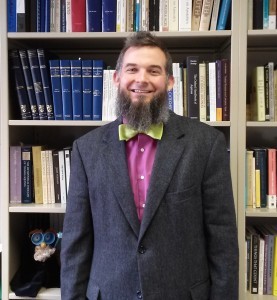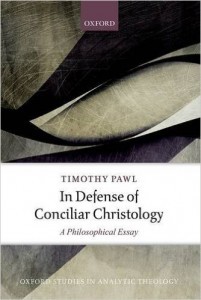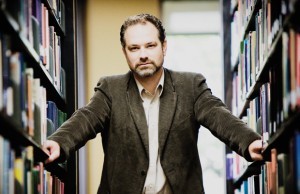Randal Rauser's Blog, page 158
February 26, 2016
Paul Beach and Jonathan Strand debate the Rationality of Belief in God
Paul Beach and Jonathan Strand’s debate on the rationality of belief in God is now available for viewing. Check it out!
February 25, 2016
86. Making Sense of the Incarnation: A Conversation with Timothy Pawl


In 1977 John Hick published The Myth of God Incarnate, an edited collection of essays by leading scholars which fell like a bomb on the playground of British theology. The objections to the incarnation presented by the contributors to that book were many, but perhaps the most incisive was presented by Hick himself as he railed against the very coherence of the doctrine:
“To say, without explanation, that the historical Jesus of Nazareth was also God is as devoid of meaning as to say that this circle drawn with a pencil on paper is also a square.”
The Myth of God Incarnate put many Christians on notice: the doctrine of the incarnation was under attack, not simply from the historians and textual critics, but from the philosophers.
The challenge is nothing new, of course. Two thousand years ago in a rhetorical pique the Apostle Paul acknowledge that the crucified Christ was a stumbling block to Jews and foolishness to Greeks. But if Paul was satisfied to turn back the objection with a bracing contrast between the wisdom of God and human creatures, many Christians since have sought to say more.
 In recent years contemporary analytic philosophers have turned their considerable acumen to rigorous logical defenses of the incarnation as with Thomas Morris, The Logic of God Incarnate and Richard Sturch, The Word and the Christ.
In recent years contemporary analytic philosophers have turned their considerable acumen to rigorous logical defenses of the incarnation as with Thomas Morris, The Logic of God Incarnate and Richard Sturch, The Word and the Christ.
There is no doubt that the tools of analytic philosophy have yielded much fruit in the provision of precise definitions, succinctly articulated paradoxes, and carefully reasoned solutions.
On the downside, the stripped down analytic discussion tends to leave out quite a bit, not least of which is the richness of the historical traditions that forged the very doctrines under debate.
That brings me to Dr. Timothy Pawl’s new book, In Defense of Conciliar Christology: A Philosophical Essay.
Tim is an Associate Professor in philosophy at the University of St. Thomas, in St. Paul, MN where he specializes in metaphysics and philosophical theology. He is married with five children and despite a busy home life finds time to think about one of the deepest mysteries.
And in his new book Tim offers a rigorous new defense of orthodox Christology. But as the title suggests, In Defense of Conciliar Christology defends not merely the minimalist incarnation beloved of many an analytic philosopher. Instead, it provides a rigorous defense of the full blooded Christology borne of the ecumenical councils of the church. Within these pages the Chalcedonian Definition isn’t a white elephant bequeathed to the church by squabbling fifth century bishops. Instead, it is a rich repository of theological expression. And with Dr. Timothy Pawl it has found a capable expositor indeed.
To read more from Timothy Pawl, you should definitely check out his book. In addition, you can read some of his outstanding journal articles here.
February 24, 2016
Help Name My Next Book
As many of you know, I’m currently writing a book with Justin Schieber of Real Atheology fame. The book is contracted to Prometheus and hopefully should be released this autumn. But right now we’re in that brainstorming stage looking for a title (and subtitle). The book consists of one long conversation of good-natured debate on the existence of God. So if you have any ideas for a title or subtitle, feel free to post them below and I’ll forward them to the editor.
How do you celebrate five + years of blogging?
It’s been over five years since I started blogging at randalrauser.com. During that time I’ve aged but my photo in the webpage header hasn’t. So I decided it was time to update the image. Since I happened to have a recent photo where I was reasonably well groomed, I decided to use it. Now 37 year old Randal has been replaced by 42 year old Randal. Five years closer to the tomb.
Thanks to Tim Willson for taking the photo and to Darryl Frayne for redoing the header.
February 22, 2016
The Blustery Word Salad White Noise of Donald Trump’s Campaign Manager
I was sitting at my computer this afternoon with CNN playing in the background when Erin Burnett asked Donald Trump’s campaign manager, Corey Lewandowski, why Trump retweeted a tweet questioning Marco Rubio’s legal status to become president of the United States.
Burnett: “Corey why would he retweet a tweet questioning Marco Rubio’s citizenship if he doesn’t know anything about it?”
What followed from Lewandowski’s mouth was an awe-inspiring litany of bunkum, claptrap, bluster, word salad and white noise: anything to avoid answering the question. Here’s his response verbatim:
Lewandowski: “Well look, you know it is a retweet is a retweet basically. You know, he has, he has um, millions of followers on there. A lot of people say different things. He retweets them. Sometimes you guys complain if he retweets. Sometimes you complain if he tweets. You know what? It’s hard to know where the information is coming from so a retweet is just simply that. Sometimes you agree with it. Sometimes you just want to draw attention to what someone else has said. It doesn’t necessarily mean you agree with it. So it’s just something that he reposted. You know, that happens all the time.”
Thanks for clearing that up.
The Irrationality of Anti-Theism: A response to Paul Beach
Faithful listeners to my podcast will be familiar with Professor Paul Beach as one of two guests on Podcast episode 84. Is belief in God rational? A Christian and atheist in debate. On that podcast Paul provides a spirited defense of atheism and the irrationality, as he sees it, of theism.
Today Paul posted a comment in reply to the lecture I delivered at Concordia University (which you can read here). In the lecture, I critique the claim that atheism is always the result of rebellion against God (what I call the “Rebellion Thesis”). As a result, it follows that one could possibly accept the proposition “God does not exist” without epistemic culpability.
With that in mind, Paul Beach offered the following comment in response to the article:
“A very satisfying read, Mr. Rauser. You seem to claim that Atheism is not necessarily immoral, but Anti-theism is clearly culpable. I wonder how you would morally evaluate my stance: I do not belief that there is a God. I have never had a spiritual experience, never experienced any compelling evidence, never heard an argument that I considered adequate to support any theistic claim. So, I am an atheist, and by your evaluative criterion, not immediately culpable for my disbelief. BUT, I also think, that if it were revealed to me somehow that God (of any sort) did actually exist, I would be morally compelled to rebel. Any God that would permit the atrocities of the world should be resisted. I could not submit to such a purposeful order. How would you morally evaluate my conditional rebellion?”
I like Paul’s pointed question and I believe it is deserving of a careful response. My response will proceed in two parts. This article constitutes part 1.
What does it mean to have an epistemically non-culpable belief?
Let’s begin with Paul’s claim that according to the analysis I offer in my lecture, he is not culpable for his disbelief in God. In order to offer a reply I should begin by unpacking a bit further what it means to lack epistemic culpability for a belief.
I propose that for a person to lack any epistemic culpability when holding a particular belief, that person would need to hold that belief wholly free from any degree of culpable bias and fully in accord with epistemic virtue.
Based on these two criteria, Paul’s claim that he is an atheist non-culpably amounts to the claim that he is an atheist wholly apart from any degree of culpable bias and wholly in accord with epistemic virtue.
Before we consider whether we should believe this, we must ask a prior question: why does Paul believe it?
The most plausible (and charitable) explanation is that Paul reasons to this conclusion discursively by way of introspective analysis. On this scenario, he begins with an introspective search for any culpable bias or any lack of epistemic virtue in his disbelief in God; upon finding no evidence of culpable bias or lack of epistemic virtue he then concludes that there is no culpable bias or lack of epistemic virtue, a conclusion which he then shares with us.
So the question is whether we ought to consider Paul’s testimony to be reliable.
At first blush it would appear that we ought to do so based on the principle of testimony. According to this principle, one ought to accept the testimony of another individual unless we have good reason not to accept it. Thus, if Paul declares by way of his own introspective analysis that his belief in God’s non-existence is wholly non-culpable and not lacking in any epistemic virtue, then we ought to accept it.
But remember, the conclusion does not follow if we have a good reason to reject it. In the remainder of this article I’m going to present one reason to question the proposition that Paul’s unbelief is epistemically non-culpable in the sense defined.
The endorsement of antitheism
My argument in this final section is simple. I will present evidence that Paul holds an attitude toward God which is irrational. And I will take it that this is sufficient to undermine — if not rebut — Paul’s claim that his unbelief in God is without epistemic culpability in the sense defined above.
To make my case I’ll turn back to Paul’s own words where he endorses a form of antitheism. To recap, he writes:
“if it were revealed to me somehow that God (of any sort) did actually exist, I would be morally compelled to rebel. Any God that would permit the atrocities of the world should be resisted.”
Let’s note first that there is a standard definition of God commonly assumed in philosophy of religion and philosophical theology. Often called “classical theism” it can be summarized as follows:
Standard Definition (SD): “God is a necessary agent who is omniscient, omnipotent, and perfectly good.”
Since Paul is a philosopher, I must assume he is familiar with this standard definition in philosophical discussions of God. And thus, when Paul insists that he would rebel against God “of any sort”, he means to include God as defined under the standard definition.
But if SD God exists, then it follows that an all-knowing, all-powerful, and perfectly good being exists. And any being which is all-knowing, all-powerful, and perfectly good would only allow evil for morally sufficient reasons.
Thus, Paul’s position entails that he would rebel against a perfect being who has morally sufficient reasons for allowing evil. In other words, Paul would rebel against a being who knows infinitely more than him, is infinitely more powerful than him, and is infinitely morally superior to him.
And that is simply irrational.
In conclusion, the fact that Paul holds an irrational belief about God provides sufficient basis to undermine — if not rebut — his claims to lack any epistemic culpability in his belief that God does not exist.
February 21, 2016
Bernie’s Biggest Blindspot? The problem of advertising in democratic elections
Bernie Sanders’ campaign has generated a lot of excitement. Who could have foreseen last May that the awkward campaign launch of this stern septuagenarian with the dandruff and wild hair would erupt into one of the biggest political stories of the last year?
While Sanders has attracted many followers with his promise of universal health care, free university education, and a dovish foreign policy, arguably the most interest and enthusiasm has centered on his critique of Wall Street corruption, and in particular the extent to which corporate money is influencing democratic elections. (By now everybody knows that (1) Sanders doesn’t have a super pac and (2) the average donation to his campaign is “27 bucks”.)
I’m sympathetic with Sanders on all these issues, even if his lofty promises strike me as more than a bit unrealistic (dare I say naïve?) in a country as deeply polarized as the United States. But what most disappoints me about Sanders is that his revolution stops at calling out corporate money in the political process. In other words, he fails to raise a flag over the extent to which public opinions are manipulated by advertising agencies. And whether those agencies are crafting their campaigns on the funds of massive corporate sums or twenty seven dollar increments of public donation, the result is the same: people are being manipulated by way of masters of manipulation whose singular goal is to persuade rather than to inform.
One might be inclined to identify examples like the presence of misleading suggestions in Sanders’ advertising (see, for example, “Sanders Campaign Ad Misleadingly Suggests Endorsements”). But that is at best a marginal issue.
To get down to deeper issues, consider the issue of branding. Today brands are not merely means to identify products, they are lifestyle complements and means of social identity. From Starbucks coffee to BMW cars to Hollister clothing, people increasingly identify themselves with particular brands. The most impactful brands with the deepest sense of personal loyalty are often referred to as lovemarks.
The key of powerful branding is that consumption of the brand eventually becomes disconnected from the product. Coca Cola discovered this in 1985 when they changed the formula of Coke based on extensive blind taste tests. Consumers preferred New Coke by a wide margin in blind taste tests. But when the switch was made, people took to the streets in outrage, demanding that their beloved Coca Cola be returned to its original (inferior) flavor. Bewildered, the Coca Cola Company realized that they had cultivated a lovemark, one whose enduring success was curiously detached from the quality of the product itself.
 It’s one thing if a sugary soft drink can be successfully marketed as a lovemark in which fidelity to the identity of the brand overwhelms the intrinsic merits of the product. It’s another thing altogether when something similar happens to a social movement or political campaign. The stakes are significantly higher when we’re in the sphere of social organization, law, and governance.
It’s one thing if a sugary soft drink can be successfully marketed as a lovemark in which fidelity to the identity of the brand overwhelms the intrinsic merits of the product. It’s another thing altogether when something similar happens to a social movement or political campaign. The stakes are significantly higher when we’re in the sphere of social organization, law, and governance.
Today advertisers draw upon very powerful tools from social scientific fields like persuasion psychology and communication theory. And this gives them a greater ability to manipulate public opinion than ever before.
Let me put it like this. When Clinton angrily challenged Sanders’ suggestion that her large corporate donors might influence her decisions, Sanders rightly replied by posing the rhetorical question: if the money has no influence in politics then why are donors making the massive donations in the first place?
One might similarly ask Sanders: if the point of paying large sums of money to advertising agencies is not to manipulate public opinion through persuasion, then why are politicians (and super pacs) paying massive fees to advertising agencies in the first place?
I have no doubt that Bernie Sanders would prefer to receive votes based on the force of his policy proposals. But no doubt he will nonetheless be more than happy to get a vote simply because people want to “Feel the Bern” just like their best friends. Sadly, this increasingly sophisticated appeal to non-rational factors to persuade voters is eroding the square of public discourse that is the core of democracy.
My eyes were opened to this problem a decade ago by the excellent 2005 documentary “Our Brand is Crisis” (not to be confused with the middling 2015 comedy of the same name). The film provides a stunningly candid portrayal of a team of American political pundits adept at manipulating public opinion who become hired guns to ensure the desired outcome of a Bolivian election. The chosen brand in Bolivia is “crisis”, i.e. vote for our guy or crisis will grip the nation. No policy proposals needed: just the visceral appeal to crisis. If you’re interested, I’ve included a link to the full movie below. It is well worth watching.
One might best summarize the philosophy with a quip from Clint Eastwood’s film “Flags of Our Fathers”. The film depicts the background of the famous Iwo Jima flag raising photo and its use for propaganda during the war effort. At one point in the film one of the men on the propaganda tour observes: “We need easy to understand truths and damn few words.”
Indeed. Crisis; Hope; Change We can Believe In; Make America Great Again; Feel the Bern.
Easy to understand truths, and damn few words.
February 19, 2016
Republican presidential candidates on torture: Ted Cruz really is a liar and Donald Trump is a brute
At the Republican Presidential Town Hall this week Donald Trump talked about the new moral climate that has been introduced by ISIS:
“They’re chopping off the heads of people. This hasn’t happened since medieval times. We need a certain toughness….”
First off, if Donald Trump believes the kind of barbarism being perpetuated by ISIS has not existed since medieval times, then his disconnection from the world is only a step or two away from Marie Antoinette’s infamous (and blessedly apocryphal) quip: “Let them eat cake.”
But more to the point: how does Donald Trump plan to respond to this barbarism? He already gave an answer. It was during the New Hampshire debate when the topic of waterboarding came up.
However, before we proceed, just what is waterboarding?
Waterboarding is a procedure which seeks to induce the sensation of drowning in the victim. It was adopted by US intelligence in the wake of 9/11, apparently a product of Dick Cheney’s infamous quip of September 16, 2001: “We also have to work, though, sort of the dark side, if you will.”
In 2008, during the height of the debate over whether waterboarding constitutes a form of torture, journalist Christopher Hitchens submitted to being waterboarded. His response was unequivocal: it is torture. Here is the video of the procedure to which he was subjected:
Is it really any surprise that the experience of drowning constitutes a form of torture?
Ted Cruz the Liar
However, when Ted Cruz was asked about waterboarding at the New Hampshire debate he expressed his reluctant willingness to employ it as a method. But lest you think this means Cruz endorses torture, he then added that it isn’t torture based on the following statement: “Under the law, torture is excruciating pain equivalent to losing organs and systems.”
Note the wordsmithing here. What is “equivalent to” supposed to mean? On one interpretation, Cruz means that torture requires the actual destruction of organs and bodily systems. But that’s a ridiculous definition, one which isn’t recognized by the UN or the Red Cross. And think about this: on this interpretation, ramming bamboo shoots under your fingernails doesn’t constitute torture. But this is absurd. (If you don’t believe me, ask somebody to ram bamboo shoots under your fingernails and then get back to me.)
So what’s the other interpretation of “equivalent to”? On the second interpretation, it could mean a degree of suffering that approximates the kind of intense suffering that would regularly lead to the loss of system function, even if in this case it doesn’t do so. But note how highly subjective this is. Who is to say that the repeated experience of drowning is not equivalent to the kind of suffering that would lead to the loss of system function?
Ted Cruz has a very long and distinguished legal career. In other words, he knows what he’s saying. He’s no buffoon. His words are well chosen. Consequently, he knows that this answer is ambiguous and that the ambiguity in question cannot pratically be teased apart and rebutted on the debate stage.
In short, his answer amounts to an intentionally ambiguous response that is either obviously false (first interpretation) or unjustified and probably indefensible (second interpretation). And he provides this deplorable response as a way to appear both humane and tough on terrorism all while endorsing the barbarism of waterboarding. This kind of response should be called out for what it is: misleading and thus deceptive. Since he knows full well what he is doing, this makes Ted Cruz a liar.
Donald Trump the Brute
What about Donald Trump? Thankfully here things are more straightforward. The Donald doesn’t need to worry about idiosyncratic and deceptive definitions of torture. Instead, he boldly insisted in the debate that he would “bring back a hell of a lot worse than waterboarding”. In other words, Trump promises that simulating drowning is nothing compared to what he will do to suspected enemy combatants. (Just make sure they really are guilty Donald, unlike that poor cabbie that was tortured to death by American soldiers.)
But hold on. What does “a lot worse” mean, Mr. Trump?
Well, Mr. Trump, if you’re lacking for ideas, perhaps you might want to revisit the medieval era, the same period where they were regularly chopping off heads. You see, those medievals developed a range of other means of persuasion which make waterboarding look like child’s play. The “pear of anguish” is very clever in the way it metes out suffering on its hapless victim. The “breaking wheel” is as agony-inducing as it sounds. And don’t forget the “heretic’s fork” (though you might want to rename it: the “enemy of freedom fork” sounds much better).
And won’t it be deliciously ironic when you can visit your medieval tortures on the barbarians themselves? You might even call it, an eye for an eye.
February 18, 2016
The Testimony of Atheist Converts to Christianity
Philosopher Stephen Graham just posted an article titled “Are There Any Honest Atheists?” which engages with my book Is the Atheist My Neighbor? Graham and I are of one mind on this topic, so I don’t have any points of critique to raise. However, I do want to highlight two points that Graham makes.
The implausibility and offense of the Rebellion Thesis in an illustration
First, Graham illustrates the implausibility — and indeed the offense — of the Rebellion Thesis with an illustration of two men in conversation. John tells George that he has decided to become a vegetarian based on the conviction that eating meat is wrong. But George replies that John doesn’t really believe this. In fact, despite his earnest entreaties to the contrary, John still knows deep down that eating meat is okay. (Perhaps his “vegetarianism” is a manifestation of rebellion against the Cattlemen’s Association. Whatever it is, it isn’t genuine.)
Crazy right? How could George possibly think it right to dismiss John’s earnest and heartfelt testimony? What gives George the right to claim that John is, in fact, suppressing his knowledge that eating meat is really okay? And yet, that’s precisely what George does. By the same token, the Christian who claims the atheist really does believe God exists is engaged in an equally presumptive and offensive dismissal of the atheist’s testimony to the contrary.
Graham concedes that the analogy is, as he puts it, a bit of a parody. Nonetheless, it does effectively convey the striking nature of the Christian’s insistence that atheists are actively suppressing their belief in God.
The Rebellion Thesis meets the testimony of former atheists
So that’s the first point I wanted to highlight. Now for the second. At this point Graham makes an intriguing observation against the Rebellion Thesis which I had not considered before:
“Christians rarely report their conversions as being an acceptance of what they already really knew, but rather most of us understand it as a ‘seeing the light’ or finally coming to believe something we honestly didn’t believe previously.”
“If the rebel thesis was right, then the vast majority of Christians would report their pre-Christian lives as being a state of rebellious rejection of truths they really knew. To the best of my knowledge this isn’t the case.”
This is a very interesting observation. And I can’t help but note the parallel with the recent debate over whether Muslims and Christians worship the same God. (By “worship the same God” I mean to refer to the claim that both Muslims and Christians (i) make successful linguistic reference toward God and (ii) direct particular worship practices toward God.)
Christians who believe that Muslims and Christians do worship the same God point out that Muslim converts to Christianity tend to believe their understanding of God has changed. They don’t believe that when they converted to Christianity they ceased to believe in one God and started to believe in another. This is how John Stackhouse explains the point:
“Christian missionaries (and missiologists) have reported for a very long time that converts from Islam to Christianity routinely testify that they did not change Gods, but came to understand the One True God better…and especially to understand Jesus aright as not merely a highly regarded prophet but as the divine-human Lord and Saviour. Much like Saul on the road to Damascus, many point out, these people undergo tremendous change—that’s why it’s called conversion, rather than merely a theological correction—but they do not drop one deity for another.” (Source)
Now let’s tie this back into the discussion over atheists and the Rebellion Thesis. Just as the testimony of former Muslims converting to Christianity falsifies the “other God” hypothesis, so the testimony of former atheists who convert to Christianity falsifies the Rebellion Thesis. The former-Muslim-turned-Christian says “I was worshipping God as a Muslim, albeit incorrectly!” and the former-atheist-turned-Christian says “When I was an atheist I didn’t believe in God’s existence. I only came to believe God exists when I became a Christian!”
“Wait a minute!” retorts the hypothetical defender of the Rebellion Thesis. “Aren’t there also former atheists who state in retrospect that their former state of atheist disbelief was not genuine? Don’t some former atheists insist that when they were an atheist they were sinfully suppressing belief in God?”
I agree. There may well be such people. Indeed, I fully suspect that there are. But that doesn’t provide evidential support for the conclusion that all atheists are in rebellion against God.
Consider: if you want to claim that all Muslims are terrorists, it isn’t enough to provide some token examples of Muslims who are terrorists. And if you claim all Canadians are polite (or boring), it isn’t enough to provide some token examples of Canadians who are polite (or boring). And if you claim all illegal immigrants are lazy, it isn’t enough to provide some token examples of illegal immigrants who are lazy.
So how could anybody possibly think that when it comes to atheists in rebellion, we just need a few token examples?
February 17, 2016
85. No Easy Answers: Kelly Kapic on God, theology, and suffering


Kelly Kapic menacingly blocking your path in the library. (Don’t worry, he’s not really angry.)
“Remember that you are dust, and to dust you shall return.”
So go the words of the Celebrant in the Ash Wednesday service that initiates the season of Lent. Dust we may be, but we are dust that thinks, dust that knows, dust that feels. We are dust that suffers as it is forced to grapple with its own mortality.
The problem of suffering and evil is one to which I have devoted more than my share of time and reflection. But typically I do so in the relatively safe confines of the ivory tower as I reflect on the intellectual problem of suffering and the challenge of theodicy.
As heady as those debates can be, they pale in comparison with life in the trenches, life that wrestles with evil and suffering on the frontlines of human experience, the world of pastoral theology and ministry.
This brings me to today’s guest. Doctor Kelly Kapic is Professor of Theological Studies at Covenant College where he has taught for the last fifteen years. Kelly is the author and editor of many books including Sanctification: Explorations in Theology and Practice (IVP Academic, 2014) and Pocket Dictionary of the Reformed Tradition (IVP, 2013).
Previously, Kelly was on The Tentative Apologist Podcast sharing his thoughts on the discipline of theology. Currently he is researching and writing a book titled Defiant Hope: A Theological and Pastoral Meditation on Suffering and he joins us now to offer his thoughts on God, theology, and suffering.




